Pakoras (Spicy Tempura) in the Pakistani Manner
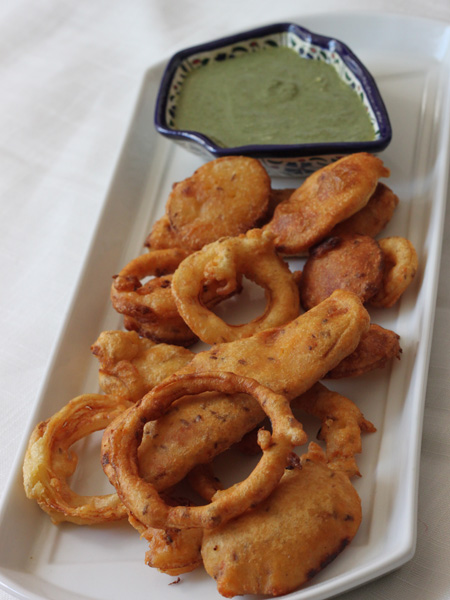
Pray, Love and Eat
Guest Post written by Baba, my father.
Every child has a lucky day; mine was Thursday. It was the day Agha, my father, would take my brother and I to meet our grandparents and cousins inside Lahore’s Old City.
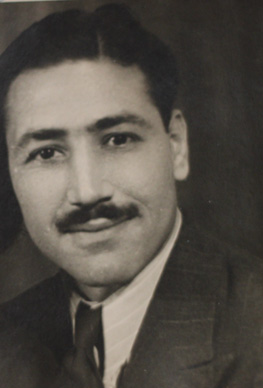
Agha
The evening would commence when our Morris Minor headed towards the mazar (shrine) of the renowned 11th Century Sufi Saint Ali Hajweri, lovingly known as Data Ganj Buksh, the ‘Bestower of Spiritual Treasures’.
The shrine lay just outside the famous Bhatti Gate.
Lahore was built as a walled City with 13 ancient gates as a protection against invaders.
Thursday is always a festive occasion at the Data Ganj Buksh’s shrine with thousands of devotees milling around, buying flowers for offering, eating spicy deep fried fish or jeelibis-sweet syrupy pretzels, or negotiating the price of food meant to feed the devotees.

The Shrine of Data Ganj Buksh
Agha would take off in the tomb’s direction after installing us in the outer courtyard where the qawals (devotional singers) rendered Sufi poetry, celebrating the oneness of religions and humanity, while fakirs performed pirouettes to rhythmic music and drums.
After his supplications, Agha would lead us to the tomb so that we too could pay respects and make a wish.
Invariably, my little secret prayer was to receive the maximum amount of sugar coated almonds which the sajjada nasheens-the hereditary shrine mangers, would hand out to kids, at the exit.
Tragically, the edifice of my childhood mystical experience was recently shattered when heartless terrorists blew devotees to smithereens at Data Ganj Buksh’s shrine earlier this month.
After this spiritual cleansing we headed for Lahore’s Inner City through its Roshani Gate located in the Northwest corner of the City, famous for the “Dancing Girls of Lahore”.
Our car meandered like molasses through the city’s narrow alleys, reaching Choona Mundi in the precint of Sheranwala Gate, where my grandparents had built a haveli known as Bangla Ayub Shah.

My great-grandparents: Shahzada Muazzam Jan & Shahzadi Fatima Begum
In the ‘50s there were no cell phones, not even that many landline connections, but fortunately Bibi, my grandmother had developed a perfect sense of our arrival time.
She would always anticipate it, squeeze us warmly and have on offer a plate of sizzling pakoras- spicy tempura, prepared by the famous Boota who had set up shop in front of our ancestral home.
Actually, it’s only after the passage of decades that it dawned on me that city life styles are universal.
Whether one lives in Manhattan or Inner City Lahore the most delicious foods are accessible 24/7 and at stones throw, from anywhere.
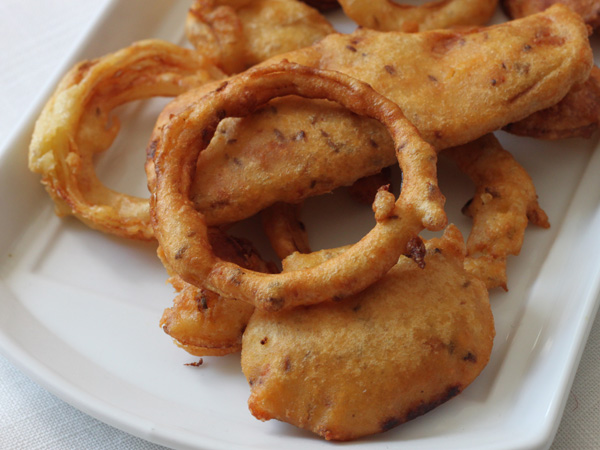
Spicy Tempura: Vegetable Pakoras
As if to prove this phenomena, Bibi would order succulent lamb kebabs and fresh nan from Kalifa Kebab joint, adjacent to our home.
The kebabs had earned a reputation across the entire City, since Kalifa (Caliph) had developed and mastered the art of producing the highest quality kebabs, defined by their near-zero fat content and exotic condiments which made them light and silky smooth-the kebabs would crumble even with the most tender touch, while its aroma would latch on to one’s memory forever!
Regrettably, Khalifa took the kebab recipe with him to the grave leaving only a few assistants with the technique, but what good is technique without secret ingredients?
The Thursday visits would end with a stroll to Bibi’s sisters’ home in the adjacent compounds, each with its own bubbling fountain, colored window panes, ornate mirrors in the living room and an “improvised heater” (known as a sandali in dari): coal embers placed under a wooden table and covered with the largest duvet.
Bibi’s eldest sister Khawar Jan would be sitting upright aided by a bolster pillow and dragging at her nargile.
Her stern husband our senior grand dad Shahzada Saleh Jan seemed perpetually glued to a radio with a green tweaking magic eye-it resembled a Cyclops, which sent a slight tremor in my still infant heart.
After receiving our blessings we rapidly retreated to Bibi’s domain where the farewell dessert awaited us.
There were choices: kheer (rice pudding) or gajarella (a milky carrot and rice pudding), even heavenly diamond shaped burfi (made of the purest milk).
All these were procured in a flash from the next door Milk and Sweet Meats vendor, Ilim Din (the Knowledgeable One).
Since there were no refrigerators in those days the dessert plates were placed and cooled on ice slabs.
The pudding was embellished with slivered almonds and saffron/pistachio dust, mouth watering to the extent that I would polish it off with my little fingers.
The dessert gorging event marked the end of another memorable circle of our own version of “Pray, Love and Eat“.
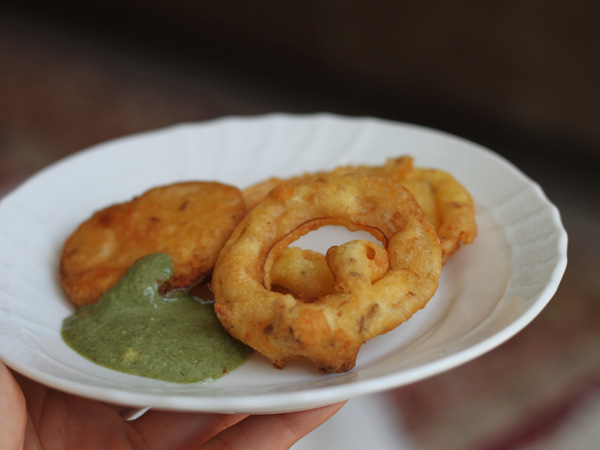
Pakoras with paudinay ki chutney (mint and yoghurt)
Pakoras (Spicy Tempura) in the Pakistani Manner
Instructions
- You will have to deep-fry the pakoras.
- Place oil (2-3 inches of it) in wok on medium-high heat.
- Select some vegetables of choice, I used aubergine, potatoes and onions.
- Slice them very thinly. Roast some zeera (whole cumin seeds and set aside).
- In a mixing bowl, combine besan (gram flour) with salt, baking powder (a tsp should do), roasted zeera (cumin seeds) and red pepper flakes.
- Slowly add in water, a few drops at a time, and stir till it becomes a thick mixture, a bit like cake batter.
- Dredge your vegetables in the batter and test one in the wok. It should slowly turn golden.
- If it burns, turn the heat a tad bit lower-you don't want a crisp crust with raw vegetables inside.
- You will have to play around with this through trial and error.
- Continue to drop dredged vegetables into the wok one by one.
- They should take about 1 minute per side, to become a golden brown.
- Serve with a mint-yogurt chutney and piping hot builder's tea- a Pakistani version of 'afternoon tea'.

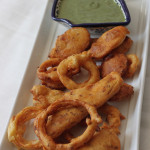






A lovely post, and so bittersweet given the enormous tragedy of the shrine. But I love the idea that city eating is a universal experience—it’s so true that sharing food is easy here in New York as it was for you in Lahore. One can then concentrate on the enjoyment of being together, as your beloved Bibi so clearly did. Thank you for sharing your memories.
There is so much joy to be found in the traditions and rituals of family feasts, it is the glue that binds us and can be found as much in the preparation as in the eating. A beautiful post that makes me nostalgic for my own much missed grandparents. As for the Sufi poets, well, I would take up far too much space if I got started on this!
What a thrill to have your “baba” guest post! Loved it and the photos ; read all your posts, whether yours or his with the same riveted attention I bestowed on the author of the kite runner, minus the tears that his books caused me. Sad though that the beautiful monument was ripped to shreds and caused all these casualties. Violence is so senseless.
A guest post from your father – what a great family you have! A fabulous nostalgic post too.
I’ve got to try cooking pakora at home… I bet it’ll be better than a lot of the ones you get in the shops.
Touched my heart, it did Shayma. To have your Baba write a guest post is beautiful. So much deep connect! Reading it makes it all feel surreal; like I’m there all along. We might have just been across borders, but the emotions, the family ties, the ambiance and the pakoras are quite the same!
Thanks for giving us a glimpse of life in Lahore in the 50s and photos of your great grandparents. Pray, Eat and Love is the enduring story of food and love, but told with a touch of nostalgia!!Thanks Spicey.
Your Baba sent me a message to read his post to Fauqi, and I can assure you he sat there with tears rolling down his cheeks. It was so touching and as they all shared their childhood, many memories are common and much loved and remembered. Good luck, happy memories share more. God Bless
What a wonderful guest post from your Baba, delving further back into your family history. It gives a glimpse back into the past, bringing it to life and highlighting how not much really changes in the way people live their lives, esp in the City.
Very well-written. And how true is the observation on city lifestyles. :)…at heart, i think we human beings are all one.
A wonderful post by your Baba. As I was reading it, I really felt sadness that Pakistan is not the same anymore, as exemplified by the Data Darbar bombing.
I love reading family histories, I think we all can relate somehow.
Lovely tempura-style pakoras! mmmmm
Gorgeous post Shayma. Nothing better than nostalgic memories from our parents. The pakoras look delicious with the chutney. Perfect when is cold or raining with a hot cuppa.
Aww, Shaymss- this is so sweet, I love that he’s done a guest post for your blog. He must be so proud of you. And now I know where your talent comes from, he has the same way with words that you do. Just lovely!
A lovely post written by your Baba,took me back to our own childhood memories in Lahore.Wish that we could get our old Lahore back.
I adore pakoras! I will have to try to make these at home. Thanks for the loose recipe. 🙂 Yours look delicious.
It is so wonderful finding your blog. I love the way you write as well as your recipes. I will be coming back for more!
Magda
Shayma darling, please send your baba a big kiss from me – this is vintage Owaise – one of the best storytellers i have ever met – the writing – funny & sad, as the author – kind, real, vivid, intelligent. I remember perfectly the first time you came over to a dinner and very early in our friendship, & brought with you a huge tupper with pakoras – surely made under Owaise´s directions. do you remember?
thank you for sharing these memories, Owaise, & thank you also for the photos – am looking forward to visiting Lahore on day with you – surely things must and will change, and people will come to their senses. Ojala! much love
nicely done, baba of the lovely shayma. i see where your daughter gets her passion for culinary adventures, family, history and memory. I so enjoyed this post and cannot wait to get my hands on some fresh pakoras.
take care!
L
Shayma your eloquent prose is always such a treat, especially with the memories you associate with each recipe – been having a really bad day at work and this really helped in making my day that much better!
Can’t wait to read your next blog 🙂 Lot’s of best wishes from me to you!
Thanks, Owaise for the nostalgic memories. Tears swelled in my eyes like Fauki’s.The next post should cover the Harrissa we used to have early in the mornings after a healthy jog with Fauki’s father Papa in their verandah. Then the visit to old Anarkali bazar for the nourishing large glassess of Lassi with the famous khoya peras.The falooda we had at Macloed Road, the tik tika,& last but not the least, the Chikar Cholas outside our school which is still located there at the foot of Masjid E Shuda. I will try & send you the photos of all these places soon. Love to u & Shayma. Tarik
Fantastic, it is really moving. Love, sympathy, respect and nostalgie, let alone the superb and vivid language – all in this wonderful memory that awakes the memories of your own ancestors. Blessed be the person who cherishes this feeling and keeps giving tribute to those , who brought us up and enriched our childhood.
Million thanks and bows.
Shayma,
I have been away from your blog for far too long…I have missed so much! This is a lovely post from your father. The old (and new) photos are wonderful and the pakoras look fantastic.
Marvelous post sir. As a Lahori, I’ve heard of the places you and your aquaintances mention in the post and following comments, from my elder.
Sadly sir that Lahore is changing every day. Mc Leod road now is a mess of a furniture and motorbike market, apart from Lakshmi where old restaurants like Tabaq and Lasani are still going strong.
Likewise I only faintly remember the old cinemas from my childhood in the late 80s, which are there no more. I’ve only heard of the rush on Abbot and Ferozepur roads when the movie shows ended and people thronged the street food and restaurants on these roads. Now Abbot road is a car parts market and Ferozepur road is a sardine can of cars packed bumper to bumper 24 hours.
I’m envious of the Lahore which the generations preceding mine saw, experienced and lived. Now all what we have is a growing snobbish atittude and an expensive coffee house fascination.
My friends think I’ve lost a screw or something when I ask them to come with me to places like Nisbet road for Hareesa or Lakshmi or jail road or the old city where according to them they won’t be seen dead but once I pull them along, they morph back into the typical Lahori once again.
I guess along with Lahore, the denizens have changed but only superficially. Scratch the surface and the old Lahore still shines through.
P.s sorry for the rants been wanting to share this with anyone for a long time.
Btw sir with Ramadan around the corner,( the first fast is expected on the 12th) it was very apt writeup. Pakoras, samosas, kachoris, jalebies, dahi bars various chats and a whole lot more will be adorning Lahore’s roadside bakeries and confectioneries. No wonder most of us here complain about having gained a few pounds after Ramadan every year. 🙂
How wonderful to have your “Baba” post this dish, it looks fabulous. I love his “no-recipe” recipe….a wonderful way to cook. – S
It is far too long since I stopped by here to read, I have missed such a lot. What a beautiful post, so heartfelt.
What a beautiful post Shayma, such dreamy writing and a gorgeous recipe to boot
I am in love with your blog! your posts put me at ease every time I ache for home. wonderfully done
I’ve enjoyed this very same snack during the teas our family used to have in Lucknow. My mother-in-law insisted the pakoras should be served piping hot so our cook Mahinder Singh would serve them only that way. What a delicious memory!
I belong to chitral and belong to Khisrowkhel tribe. My ancestors belong to Afghanistan. I have recently came to know about some of my tribesmen living in bangla ayub shah india and also in Pakistan. If some 1 has any info about them then please inform me. I am so curious
salam what a life i want like this
Wonderful post! Your childhood memories of beautiful Lahore were a pleasure to read.
I’m quite sure that your grandparents house is this one:
http://www.walledcitylahore.gop.pk/index.php/demo-proj/78-wcl-articles/134-bangla-ayub-shah
Thankfully it is marked for restoration under a long overdue project. You can find more pictures of the haveli on the WCA’s Facebook page here:
https://www.facebook.com/walledcitylahore
I’m sure the Walled City Authority will love to hear about your memories of the house as they have been asking around for information regarding sites chosen for restoration.